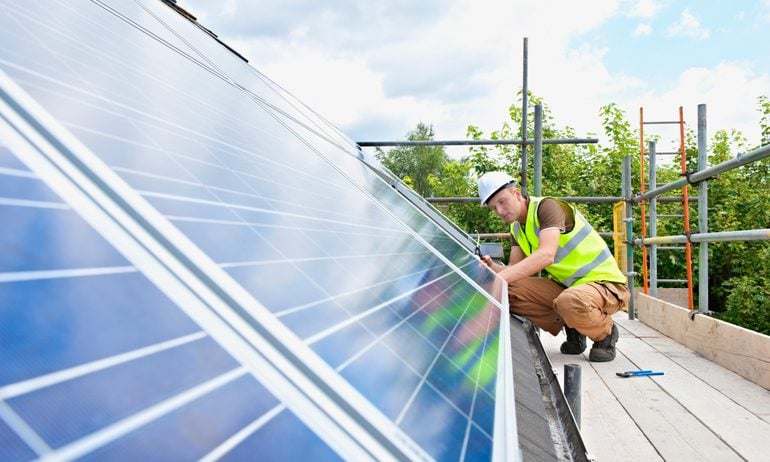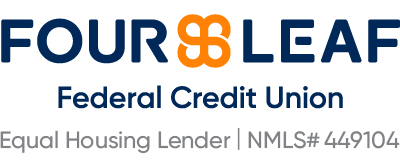What to Know About Solar Panel Financing
Consider factors like tax incentives, interest costs and repayment terms when deciding how to finance solar panels.

Many, or all, of the products featured on this page are from our advertising partners who compensate us when you take certain actions on our website or click to take an action on their website. However, this does not influence our evaluations. Our opinions are our own. Here is a list of our partners and here's how we make money.
On the right home, solar panels can substantially reduce monthly electricity bills, but they cost thousands of dollars to set up. If you don’t have cash to pay for them and want to take advantage of federal tax credits, financing may be the way to go.
Here’s how to tell if solar panels will save you money and which financing option may work best.
How much do solar panels cost?
The average cost of installing a 11kW residential solar panel system in 2024 is $22,022 after federal tax credits, according to EnergySage, a solar marketplace with funding from the U.S. Department of Energy.
The cost varies by location, the type of solar panels and the system’s size, but national estimates for a 6kW system before incentives range from $14,100 to $21,240.
2024 solar panel costs by state
How to finance solar panels
Cash is the cheapest way to pay for solar panels and their installation. You’ll also reap savings quicker because the lower utility bills won’t be offset by loan payments.
Alternatively, you can finance solar panels with a personal loan, home equity financing, a government loan program or through a contractor.
When deciding how to finance solar panels, consider factors like tax incentives, the repayment term and whether you qualify for a low annual percentage rate. Aim to choose the option that costs the least in total interest but has affordable monthly payments.
Personal loan
A personal loan is money borrowed from a bank, credit union or online lender. The financing is unsecured, meaning neither your home nor the solar panels are collateral for the loan. Loan amounts range from $1,000 to $100,000, and repayment terms are typically two to seven years.
Personal loan rates range from 6% to 36%, and lenders look at factors like credit score, debt-to-income ratio and cash flow when assessing a borrower’s application. Many lenders let you pre-qualify for a personal loan to preview potential loan offers without undergoing a hard credit check.
» MORE: Compare solar loans
Pros of personal loans
Short repayment terms: Your net savings on a solar system will show up sooner because personal loans have shorter repayment terms than home equity and contractor financing.
Fast funding: Approval can take one business day, and most personal loans can be funded within a few days after that, meaning you could have funds within a week of applying.
No collateral: When a loan has collateral, like a house or a car, failure to repay can result in the lender taking possession. With an unsecured personal loan, there’s no risk of losing your home, though your credit score will take a hit if you miss payments.
Cons of personal loans
High rates: Personal loans have high rates compared with home equity financing and government loans. The lowest rates go to borrowers with good to excellent credit (690 or higher), high incomes and low debt.
No tax benefits: These loans don’t have the tax benefits you’d get with a home equity loan or line of credit. There are other tax incentives for adding solar panels (more on those below) but nothing extra for using a personal loan.
May charge an origination fee: Some lenders charge an origination fee, which is usually 1% to 10% of the loan amount and deducted from the loan proceeds. For example, if your $20,000 loan has a 6% origination fee, you’ll receive $18,800.
When a personal solar loan is best
A personal loan may be the best option if you:
Don’t want to use your home as collateral for the loan.
Need to finance the panels, but don’t want to carry debt for a long time.
Want the panels installed soon.
Qualify for a low APR.
» MORE: Best home improvement loans
Home equity financing
Home equity loans and lines of credit require your home as collateral for the loan. You must also have enough equity to get the right loan amount. With equity financing, you can typically borrow up to 80% of your home’s value minus what you owe on the mortgage. For example, if your home is worth $300,000 and you owe $200,000, you can borrow up to $40,000.
Home equity loans and HELOCs usually have single-digit APRs, which is lower than most personal loans. Depending on which you choose, the repayment period is generally up to 20 years.
Pros of home equity financing
Low rates: A home equity loan is a second fixed-rate mortgage, while a HELOC usually has a variable interest rate. In both cases, the average rate is lower than most personal loans.
Tax benefits: Whenever you use home equity financing for a home improvement project, including solar panel installation, you can deduct the interest on your taxes.
Cons of home equity financing
Extended repayment terms: If you use home equity financing, you could be paying off the solar panels for well over a decade, which may offset the savings on your utility bills.
Your home is collateral: If you’re unable to repay a home equity loan or line of credit, the lender could take your home, and your credit score will drop.
When a home equity loan or line of credit is best
A home equity loan or HELOC may be the best option if you:
Don’t mind using your home as collateral.
Want a low-rate financing option with tax-deductible interest.
Are willing to pay for the solar panels for a decade or longer.
HELOC & Home Equity Loans from our partners

on New American Funding
580
$750,000
on New American Funding

on FourLeaf Federal Credit Union
670
$1,000,000
on FourLeaf Federal Credit Union
FHA 203(k) loan
An FHA 203(k) loan allows you to roll the cost of home improvement projects into your new or refinanced mortgage. However, only some projects are eligible, like energy-efficient upgrades, replacing heating or air conditioning, and installing a new roof.
Since a 203(k) loan is a mortgage, you’ll have to pay the interest rate for the entire mortgage term, unless you refinance. Typical mortgage terms are 15 or 30 years.
» MORE: Compare FHA 203(k) loans
Pros of FHA 203(k) loans
Soft borrowing requirements: FHA loans allow credit scores as low as 500, lower than many other mortgage lenders. However, a lower credit score may require a larger down payment.
Low interest rates: Interest rates are lower on FHA 203(k) than personal loans.
Cons of FHA 203(k) loans
FHA mortgage insurance: These loans require FHA mortgage insurance, regardless of the down payment amount.
You must find a contractor who can start within 30 days: The FHA pays the contractor for their work from an escrow account and requires work to begin within 30 days of the first payment (usually the closing date) and finish within six months.
When a 203(k) loan is best
A 203(k) loan may be the best option if you:
Can’t qualify for a home equity loan or line of credit.
Are refinancing and can get a similar or lower interest rate than your current mortgage.
Can coordinate with the contractor to start and complete the project on time.
If an FHA loan isn’t a fit, consider a Fannie Mae HomeStyle loan, a CHOICERenovation loan from Freddie Mac or an Energy Efficient Mortgage.
Contractor financing
The contractor that installs your system may offer to help you finance it using a third-party lender. Interest rates vary among installation companies but are often in the single digits while terms generally range from 10 to 20 years.
Pros of contractor financing
Convenience: Installing solar panels with a contractor that offers financing may be convenient because you can apply, be approved and get work started with the same company.
Low rates: A solar company may offer lower rates than a home equity loan or line of credit.
Cons of contractor financing
Extended repayment terms: Interest will add up — even if it’s a low rate — if the term is 20 or 25 years. Plus, the monthly payment will offset your savings for two decades.
May charge an origination fee: Some lenders charge an origination or dealer fee, which you may not have to pay with home equity and government financing.
May not offer pre-qualification: The contractor may not offer pre-qualification, which means you’ll undergo a hard credit check to see if you qualify for a loan.
Since pre-qualifying doesn’t require a hard credit pull, consider checking your rate on a personal loan before you apply for contractor financing. That way, you can decide if the contractor’s rate is fair.
When solar company financing is best
Financing through the solar panel installation company may be the best option if you:
Want the financing and installation through the same company.
Would pay less than with a personal loan or home equity option.
How much can you save with solar panels?
The amount a solar system saves you depends on variable factors like utility costs in your area, the cost to buy and install the panels, tax incentives and how much sun exposure your house receives. Here’s what to consider when calculating your savings.
Will your electric bill decrease? Review your last few utility bills to see what you pay on average. Then, estimate your savings using a solar savings calculator, like Google’s Project Sunroof savings estimator.
How long will it take to see savings? You won’t yield savings immediately after installing solar panels. The average payback period is about 10 years, according to SolarReviews, a website that reviews solar companies.
Are you going to sell your home? Depending on the type of financing, installing solar panels can take years to pay off. If this isn’t your long-term home, consider whether managing the panels would be a turnoff for a potential buyer and whether you’d pay them off before moving.
Do you expect frequent maintenance? Solar panels require at least annual cleaning to remove debris. According to EnergySage, annual cleanings cost between $15 and $30 per solar panel, depending on the system’s size, location of the home, and how often the panels are cleaned. You may also need an annual inspection, which can start at $150.
Solar tax benefits
The federal government offers a tax credit that allows homeowners to deduct a portion of the system’s cost from their income taxes. There is a 30% tax credit for solar panels installed between 2022 and 2032, according to the Energy Department .
According to the Energy Department, here’s what you need to be eligible for a credit.
The system must be installed between Jan. 1, 2017, and Dec. 31, 2034.
The system must be on your primary or secondary residence.
You must have bought the solar panels. You’re still eligible if you financed the system, but residents with solar leases or power purchase agreements are not.
The system must be new.
Local solar rebates
Your state, county or city may also offer a benefit for installing solar panels. For example, the utility company in Austin, Texas, provides a $2,500 rebate for homeowners who go solar and take a solar education course.
Search the Database of State Incentives for Renewables & Efficiency to see what’s available in your area, or contact your utility company.
Solar leases and power purchase agreements
If you want the benefits of solar panels without buying them, consider leasing or renting. In both cases, you can reduce your energy bill without paying a lump-sum payment to own them. However, you’ll save less money and receive no tax benefits.
A solar lease is when a solar installation or financing company owns the solar panels in your home. Leases are usually from 20 to 25 years and you pay a fixed monthly rate to use them.
A lease can save you less because the monthly payment counteracts energy bill savings. If you sell the house before the lease ends, you may have to convince a buyer to take on the lease or pay to have the panels transferred to your new home.
A power purchase agreement, or PPA, is similar to a lease, but instead of paying to rent solar panels, you pay for the energy they generate, ideally at a lower price than the standard rate. According to the Solar Energy Industries Association, the rate you pay may increase by 2% to 5% each year with a PPA .
Do solar panels increase your home value?
Solar panels can be a smart investment for your home, potentially boosting its resale value. A 2024 study by SolarReviews.com found that solar panels can increase a home’s sale price by 6.8%. However, the study also found that solar panels can decrease a home's sale price in some real estate markets.
The increase can vary depending on location, system size and energy costs.
HELOC & Home Equity Loans from our partners

on New American Funding
580
$750,000
on New American Funding

on FourLeaf Federal Credit Union
670
$1,000,000
on FourLeaf Federal Credit Union



